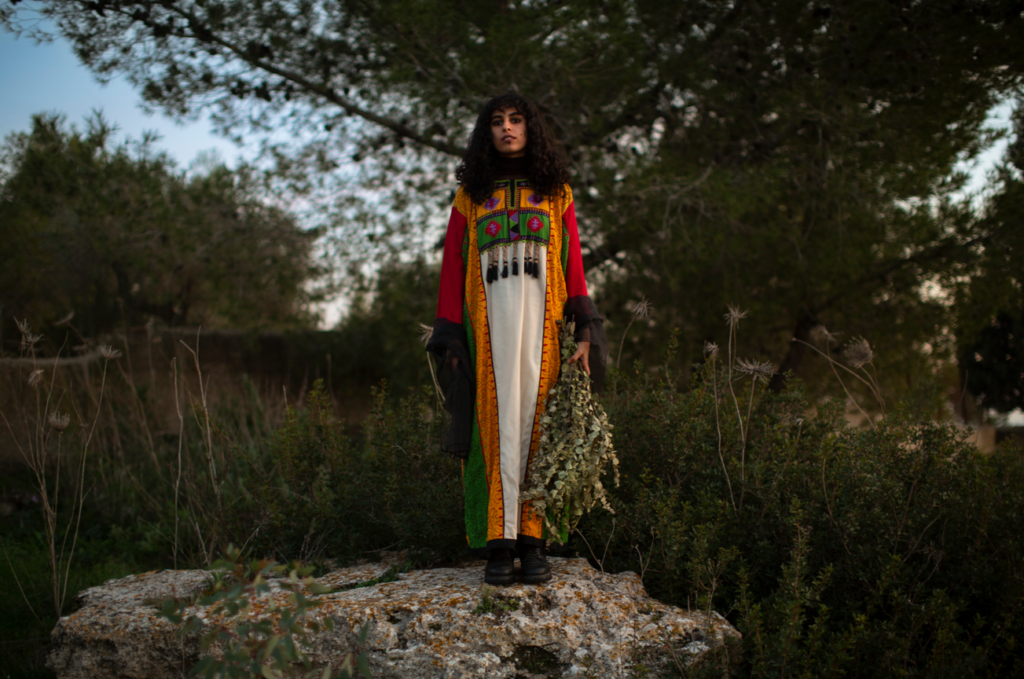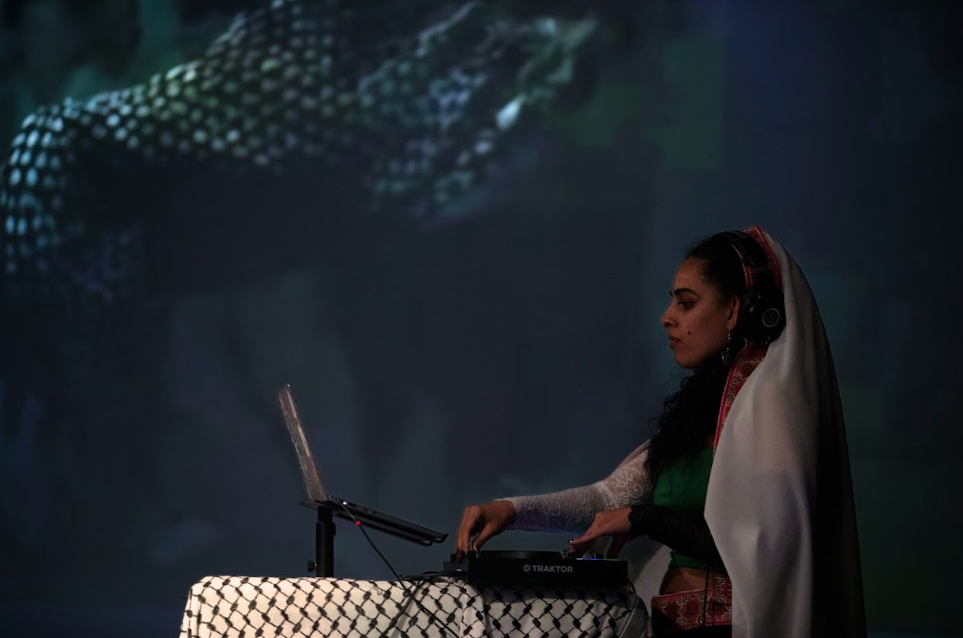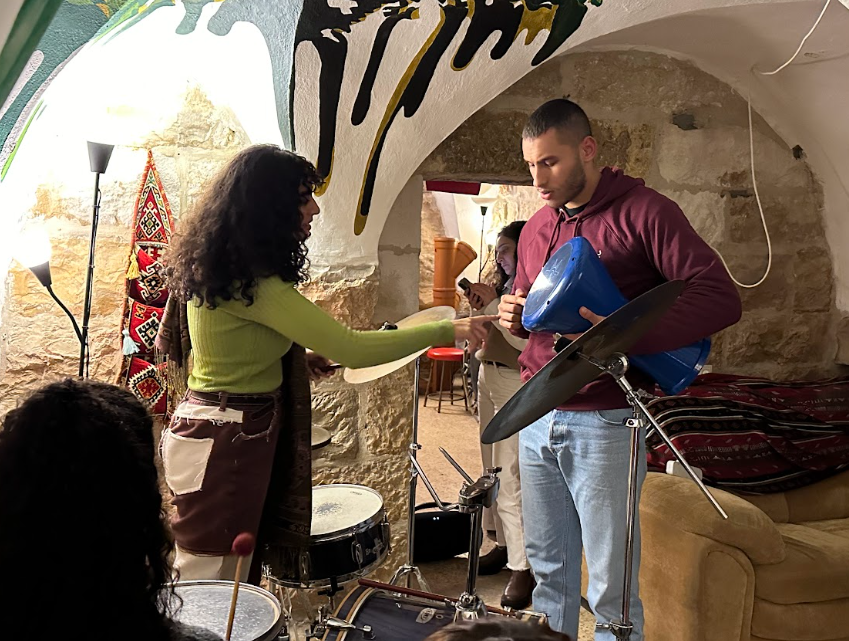"I Felt It in My Soul": 40 Minutes with Freecheh

By: Layan Srour / Arab America Contributing Writer
Freecheh’s journey through music is one of defiance and nostalgia. A Palestinian musician and curator, she transforms dance floors into spaces of resistance and remembrance between Ramallah and Detroit. Raised on a mix of techno, Arabic pop, and revolutionary anthems, she keeps history alive through education and performance. From secret drumming sessions as a child to sharing Palestinian music globally, Freecheh’s work fosters unity through sound.
What about your upbringing influenced your journey into music?
Every night, my parents would bring me and my four siblings into the salon, even though the salon is a forbidden room in the Arab house. My dad would play CDs on our big stereo for us to dance to. We would dance for at least an hour or until it’s bedtime. I think there are two reasons they were doing that, either they wanted to tire us out, or they were too tired to deal with us, so they kept us busy by dancing.
My dad loves music. He always has it on—the radio, the kitchen, or on the balcony. That really had an effect on me. My dad told me that I was dancing before I said my first words and he would take me on car rides to dance instead of going to kindergarten! I just kept on evolving. At school, I did extracurricular music activities. It was so powerful to have people doing the same beat at the same time. I felt it in my soul and my body.
My brother used to learn the drums and as a girl, I couldn’t for some reason, so I would just watch him. When my parents weren’t watching, I would speak off to play his drums. Then, I started going to parties. Feeling the bass in my body inspired me to go into DJing.
Who is Freecheh?
In Ramallah, I was bored of listening to the same music. I was listening to the same DJs and dancing with the same people in the same spaces. I wanted to start my own thing. The way I started was funny, actually. For my birthday, my sister signed us up for a gig at a local bar.
I spent so much time getting ready for it. It was a three-hour set and I had prepared 200 songs, which was a bit ridiculous. It was so fun to see everyone dancing. So, I started playing more often at that bar. The people there tell me that I’m the only DJ who can get their people to dance and enjoy their time. I decided to keep going and make it official, and that’s how Freecheh started.
“Freecheh” looks into the falahi (a Palestinian Arabic dialect) tongue. For example, we change the letter “K” into “CH”. Even Palestinians don’t know what “Freecheh” is. It’s kind of like Freekeh (Arabic food) in a falahi tongue. It gives awareness of other dialects that exist in the city and joins culture with sounds. I do a lot of projects and I didn’t want “Freeheh” to mean one thing.

How do you incorporate elements of Arab culture in your work?
It’s my music, but it’s also the vibe I give out—I use my personality as my tool for everything. I always try to incorporate it into my teaching and music. I really value cultural values and it’s important to preserve and share with others.
In my DJ sets, especially since the genocide, I try to share sounds that are that have been forgotten. I really like classical Arabic music and revolutionary music, so I try to incorporate it as much as I can. I find it so uncomfortable to sing in English, even though I speak English, I find it uncomfortable. It feels like it’s not mine, though it’s an international language.
How did the genocide affect your ability to create music?
I didn’t do anything creative for months, I was glued to the TV. I even stopped working. My creativity was blocked and I couldn’t do anything. It felt weird to do anything, I felt uncomfortable and guilty. How can I use my brain creatively if people can barely survive?
I got back into music when I was invited to do DJ sets for cultural events. My sets, however, were not in a party mode, but more as a cultural awareness thing. I wanted to be the one playing revolutionary music. My sister and I did shows in different states. People kept asking us to sing, so we sang older songs just to show the Palestinian message and show that the message still exists. It’s still happening, it’s just a bit worse.

What messages or emotions do you strive to convey in your music?
I used to get weirded out by this question, but since the genocide, I understand why people ask it. I felt like I was only seen as “someone that is occupied”. I’m seen as this victim, which I hate. I do art because I love art, and there isn’t necessarily a message behind most of what I do, but that’s changed.
So many people don’t know what’s happening in the West Bank because they don’t know that it’s separate from Gaza. I had to educate, share, and go through these tedious conversations to have people understand what we go through, what we’ve been going through, and things that are hard to hear. They’re our reality. What I do, even though sometimes I hate that my art has to have this meaning, is a goal for me.
What’s a project that means a lot to you?
I co-founded a communal hub in Palestine in 2021. It’s a lot of work because I do everything from managing to coordinating. I’m the only employee there. It’s part of a bigger collective called Space Collective, which my sister and I co-founded. Our main goal is to have a space where community members can be with each other, collaborate, and learn new things. People can develop interests into actual skills that they can use in their professional lives. We started with art, music, and film. During the genocide, people just wanted to be around each other. They didn’t come to learn how to cook or play music, they just needed to be around people. We wanted our organization to be a safe space for people. Someone once said, “I feel like I met my grandmother’s house.” This is exactly what we want. Grandma’s house is a safe space for many people. To have that feeling and to have it shared among many is so important.
Who are your musical influences?
I have a lot. Whenever someone asks me this, I think of one person: Aurora. I discovered her when she only had a few thousand listeners. Videos of her moved everything in me. How can someone even sing like this? I was listening to her every day. She portrays a lot of things that usually you don’t see or hear. Another artist I love is Ahmed Eid. He merges different genres and plays all instruments. He even founded his own communal music space in Ramallah where he works with emerging artists.
How can non-Arabs support Arab artists?
First of all, get informed. Find out where the artist is from and what surrounds that country. What’s the country’s history? What struggles do the people face? Second, listen. Try to understand the artist’s message.
What advice would you give to Arab Americans aspiring to enter the music world?
Embrace yourself. It’s a lot of fun, but you have to put yourself in those spaces. What can you provide as an artist?
About the Article and Author: Layan Srour, a Lebanese musician based in Detroit, Michigan, is passionate about blending her culture through music, research, and education in the United States. 40 Minutes With is a weekly feature where Layan interviews an Arab American musician, exploring their journey through music and culture in America. Connect with Layan on Instagram, Facebook, LinkedIn, or via email.
Want more articles like this? Sign up for our e-newsletter! Check out our blog here!









